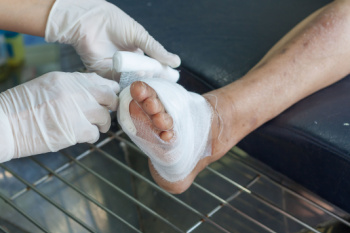
Foot care is a critical aspect of diabetic management, as individuals with diabetes are prone to foot comp-lications. Maintaining skin integrity is essential, especially in diabetic feet where issues like neuropathy and poor circulation can lead to ulcers, infections, and possibly even amputations. Preventive care and regular screening are paramount in mitigating risks. A multidisciplinary team, including podiatrists, plays a pivotal role in diabetic foot care. Podiatrists specialize in assessing foot health, identifying early signs of complications, and providing tailored interventions. They offer expertise in wound care, orthotic management, and footwear recommendations, all aimed at preventing and managing foot problems. By emphasizing preventive measures, such as daily foot inspections, proper hygiene, and appropriate footwear, podiatrists collaborate with patients to minimize the likelihood of diabetic foot complications. If you are a diabetic patient, it is strongly suggested that you schedule regular appointments with a podiatrist as part of your diabetes management.
Wound care is an important part in dealing with diabetes. If you have diabetes and a foot wound or would like more information about wound care for diabetics, consult with Philip C. Caswell, DPM from Family Foot & Ankle Care. Our doctor will assess your condition and provide you with quality foot and ankle treatment.
What Is Wound Care?
Wound care is the practice of taking proper care of a wound. This can range from the smallest to the largest of wounds. While everyone can benefit from proper wound care, it is much more important for diabetics. Diabetics often suffer from poor blood circulation which causes wounds to heal much slower than they would in a non-diabetic.
What Is the Importance of Wound Care?
While it may not seem apparent with small ulcers on the foot, for diabetics, any size ulcer can become infected. Diabetics often also suffer from neuropathy, or nerve loss. This means they might not even feel when they have an ulcer on their foot. If the wound becomes severely infected, amputation may be necessary. Therefore, it is of the upmost importance to properly care for any and all foot wounds.
How to Care for Wounds
The best way to care for foot wounds is to prevent them. For diabetics, this means daily inspections of the feet for any signs of abnormalities or ulcers. It is also recommended to see a podiatrist several times a year for a foot inspection. If you do have an ulcer, run the wound under water to clear dirt from the wound; then apply antibiotic ointment to the wound and cover with a bandage. Bandages should be changed daily and keeping pressure off the wound is smart. It is advised to see a podiatrist, who can keep an eye on it.
If you have any questions, please feel free to contact our office located in Sparta, NJ . We offer the newest diagnostic and treatment technologies for all your foot care needs.
